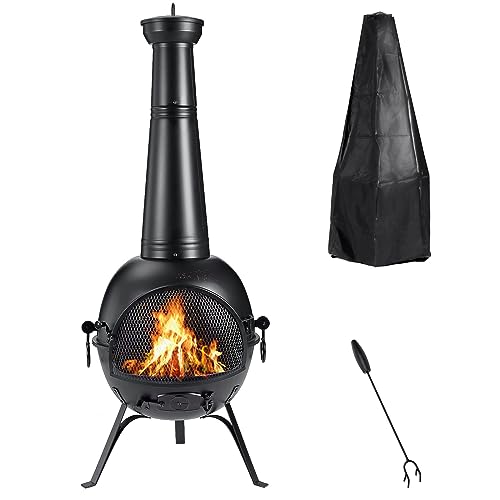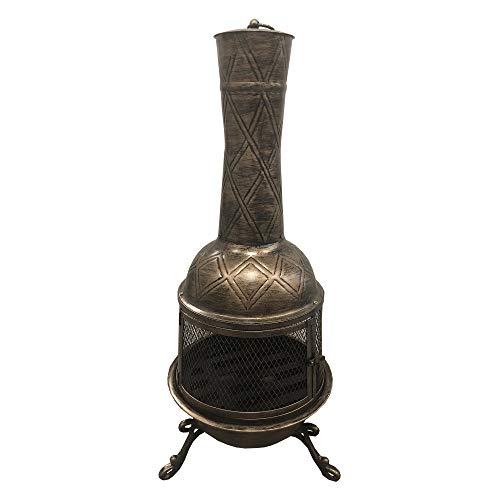9 . What Your Parents Taught You About Mexican Chimineas
페이지 정보

 chimineas (understanding) - An Authentic Mexican Fire Pit
chimineas (understanding) - An Authentic Mexican Fire PitOriginally used as a bread oven, chimineas near me reflect Mexico's rich culture. The simple design, which blends practicality and aesthetic simplicity, is timeless.
 clay chiminea chimineas are fired in kilns to remove organic material and seal the pores to reduce cracking. They can be utilized outdoors all year however they shouldn't be exposed to the elements for too long.
clay chiminea chimineas are fired in kilns to remove organic material and seal the pores to reduce cracking. They can be utilized outdoors all year however they shouldn't be exposed to the elements for too long.Origins
Imagine a warm summer evening with family and friends, enjoying delicious food in an outdoor space, kept warm by the gentle heat from your clay or Mexican chiminea. This scene is reminiscent to the Mexican origins of this kind of outdoor fireplace.
The terracotta stoves of the past were designed to serve as radiant heaters as well as ovens. They were used to help tribesmen endure the cold winter nights in their homes. Their distinctive shape was derived by their utilitarian principles that stressed practicality and communal living.
The stoves were originally made from natural terra-cotta clay, which was dried and then wood-fired in kilns. Chimineas made of clay are more rustic and do not have the protection of a glazed surface. them. Modern manufacturers create chimineas made of metals, such as aluminum, cast iron and brass. These are more robust and resistant to weather, which is one of the major drawbacks of the clay design.
The unique design of the chiminea was inspired by a pot-bellied base that rises to an extended fireplace. This form is a perfect way to contain a fire whilst directing the smoke upwards, which reduces air inhalation and maximizes heat retention.
Chimineas were used by Mexican tribes for heating, cooking and lighting. We can still enjoy their beauty and the warmth they provide in the cold autumn evenings, or even in the warm winter sun.
No matter if your chiminea's an authentic Mexican piece or a more modern version, Gardeco has a choice of styles that will suit your garden and décor. We have a variety of sizes, ranging from small to extra-large clay chiminea. We also offer clay chimineas that have decor that can be moulded, or inscribed into the body of the product.
Our range of terracotta chimineas and Mexican Chimineas are made by artisans in the heartland of Mexico. The colours and shapes can vary slightly due to the nature of the manufacturing process. If your chiminea starts to discolour you can always paint it over with an emulsion water-based paint. It is important to follow the manufacturer's instructions and care tips before using your new chiminea for the first time.
Design
Chimineas are not just functional but they also add an authentic and rustic feel to the space. They are available in a variety of styles and materials and can be matched to any furniture for your patio. They can be a focal point or blend seamlessly into the surroundings.
The clay chimenea was conceived to be practical as well as for cultural reasons. Its tall, chimney-like neck directed the smoke away from its users and its rounded, circular body exuded warmth. It was also used as a gathering place for storytelling and socializing, giving it an important role in Mexican and Central American culture.
Traditionally, chimineas were handcrafted by local artisans using wet clay, which was collected directly from the ground. This raw material was then transformed into its final form before being kiln-dried. The process of making the clay chimenea was very labor-intensive, particularly for huge ones. Typically potters would coil long snakes of clay into a cylindrical shape and then smooth the clay to form the chiminea's bowl as well as neck. The clay's rim was often decorated with patterns and carvings.
Modern chimineas for sale are typically constructed from metals like cast-iron or aluminum. Metal chimineas were a significant evolution because they can withstand moisture and high temperatures without cracking. This modification allowed chimineas be used in a wide range of climates.
Metal Chimineas are most commonly used however there are some companies that produce clay and terracotta ones. Metal chimineas are more durable and easier to clean. Metal chimineas are more sought-after than clay chimineas due to the fact that they can withstand higher temperatures and can be cleaned with ease.
No matter what type of chiminea is chosen, it is important that it be placed in the right place. It should be placed in a level space and away from any flammable objects such as trees, grass or other structures. The chiminea should be set on a concrete, brick, or stone patio and never on a wooden deck. It's also an excellent idea to put 50mm of sand or Gardeco lava stones beneath the chiminea to shield it from direct heat and keep the hot part of the fire away from the clay.
Materials
Kiln-fired terracotta and clay chimineas are still being produced by small-scale factories. The temperatures can rise up to 1000 degrees Celsius. After cooling and dried, the chimineas may be put together. Some are glazed, while others are left unglazed. These chimineas provide the Mexican feeling in a garden.
Chimineas are generally hand-painted and come in various colors and designs to fit a wide range of styles. The paint finish will fade over time and with the heat from the flame, so it is recommended to re-paint using an acrylic emulsion that is water-based.
While originally intended to be essential elements of heating and cooking for town-dwelling Mexicans, chimineas have embodied a sense of cultural heritage over the centuries adapting to various needs. These distinctive structures were not solely used by indigenous people of Mexico as bread ovens as well as played a significant role in repelling bugs and promoting social gatherings.
The unique design of the chiminea, with its wide base and narrow chimney spout permits maximum air flow into the chiminea's bottom, minimizing the intake of smoke. It also helps to retain the heat inside the top rated chiminea. This makes it ideal for cooking over.
Today, chimineas can be found in many different materials like cast iron, terracotta clay and even aluminum. Terracotta chimineas are the most common choice, offering the classic Mexican look. They are susceptible to cracking when under pressure and should only be placed on an even surface that is safe from fire. Cast iron and aluminum chimineas carry less danger of being damaged but are still elegant and sturdy.
To make sure the chiminea will last as long as you can, keep it in an area that is well-ventilated and shielded from rain and wind. It should be positioned away from any walls and structures that might catch alight as well as patio roofs or eaves that could be damaged by the sudden change in temperature that occurs when the chiminea's flame is removed. In order to prevent the chiminea's ashes from burning excessively, it is recommended that leaves are not burned and only seasoned, kiln dried logs be burned. Regular cleaning with a wire brush is crucial, as it helps prevent build up of deposits which are likely to ignite and blacken. The chiminea can be protected from wind, which will reduce the amount smoke that it releases.
Maintenance
Maintaining the equipment properly is essential to the longevity of any fire equipment. This will help to extend its life and ensure that it works safely. Chimineas can be fragile and should be kept in a protected area where they can be cared for. Even if a chiminea made of clay appears to be strong however, it could still crack and break from a variety of sources. This is why it is important to inspect your chiminea regularly for signs of wear and tear and to follow the manufacturer's guidelines on how often it should be fired.
To keep your mexican chimney looking good you must clean it thoroughly with a mild detergent. This will eliminate any dirt and grime that can cause discoloration or rust. To remove loose rust particles you should use a wire brush. It is recommended that gloves and goggles be used to protect. After scrubbing the chiminea then rinse it and allow it to dry completely. This will prevent any moisture which causes corrosion, and can prolong the life of your chiminea.
After your chiminea is cleaned and dried, it can be lightly sanded using fine grit the sandpaper. This will smooth out the surface and eliminate any rough areas that could catch embers if you decide to build a fire. Sanding can also make the appear more attractive and even. The sanding process can be followed by several coats of grill or stove paint that will enhance the appearance of your chiminea as well as protect it from rust.
Keep your chiminea from direct sunlight and wind as this could cause the paint to peel and fade. If this occurs, you can touch up the affected areas using water-based emulsion paints or masonry sprays and it's generally simple to do. It is also important to only use small fires and to add a few logs at a time to your chiminea in order to get it "broken in" and to avoid overheating.





